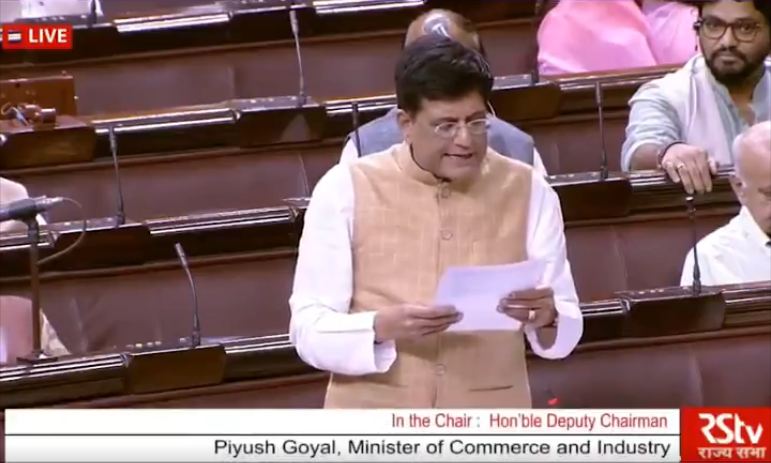The Special Economic Zones (Amendment) Bill became the first bill to be passed in parliament in the second term of Modi government. Commerce Ministry led by the dynamic union minister, Piyush Goyal, bagged the credit to pass the first bill which was cleared on Thursday. The bill allows trusts to set up units in Special Economic Zones which will serve as a strong propellant for FDIs and employment opportunities.
“The Special Economic Zones (Amendment) Bill is the first legislation of the newly formed Government under PM @NarendraModi ji to be passed by the Parliament. It will enable any entity to set up a unit in SEZs, helping boost investments and create new job opportunities,” tweeted Commerce and Industry minister Piyush Goyal.
The Special Economic Zones (Amendment) Bill is the first legislation of the newly formed Government under PM @NarendraModi ji to be passed by the Parliament.
It will enable any entity to set up a unit in SEZs, helping boost investments and create new job opportunities. pic.twitter.com/Hx8dTT7lSg
— Piyush Goyal (मोदी का परिवार) (@PiyushGoyal) June 28, 2019
The present law does not permit Trusts to set up units in SEZs as they are not categorized under ‘person’ in company law. As per the company law, a Hindu divided family, a company, co-operative society or a firm are categorized under ‘person’.
The Bill which is set to become a law after the presidential nod will replace SEZ (Amendment) Ordinance, 2019, promulgated in March. SEZs are very important to receive FDI given the liberal tax regime as well as subsidized infrastructure they provide. “SEZ policy is definitely sustainable for India. There is a limit to development that agriculture can achieve. For a jump in growth, industrialisation is necessary. You have to make a choice between agriculture and industrialization,” Nobel Laureate Economist Prof Mohd. Yunus said on SEZs in 2007.
Trusts could drive huge Foreign Direct Investment (FDI) in India given some of them operate with net revenues more than top MNCs. The government has received eight proposals from various trusts with investment amount around 8,000 crore rupees. The yearly investment from trusts in expected to be around 20,000 crore rupees. On the total investment, Goyal said “At the end of March 2019, the investment in SEZs was a whopping 5 lakh crore rupees plus and the employment was over 20 lakh and exports were over 7 lakh crore rupees.”
Previously, Niti Aayog’s proposal to create Shenzhen-style coastal economic zones (CEZs) in India’s various coastal states will help attract global MNCs to set up shop in India and boost FDI inflows. Creation of world class CEZs with world class infrastructure will help integrate Indian manufacturers with Global supply chains, for example, Indian ports have an average turnaround time of 84 hours as compared to seven hours at ports like Singapore and Hong Kong. Disadvantages like these have restrained Indian manufacturers from integrating themselves in Global supply chains. The end result is a fragmented industry with the relative shortage of large-scale firms.
There are many other changes in SEZ policy. For example, National Policy on Electronics, 2018, proposes to modify capital subsidy of 20 percent to electronics manufacturers located in Special Economic Zones (SEZ) and 25 percent to units in non-SEZs with credit guarantee and interest subsidy.
Under the new agricultural export policy SEZs will be set up for specific countries to produce agricultural commodities which these countries import regularly. The concept of special SEZs for countries is taken from New Industrial Policy which also aims to do the same for industrial goods. The liberalization of SEZ rules will help in bringing more investment to the country and given the abundance of labor, capital is what the country needs to be the ‘factory of the world’.
